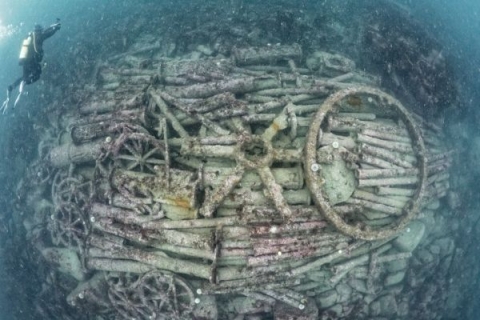

The University is one of several partners to receive a share of £14.5 million funding.
21 September 2021
7 min read
A new project launches today with a huge ambition: to reshape the future of UK marine heritage.
Exploring underwater shipwrecks using virtual reality is one aspect of the project, which will bring the UK’s rich marine history to life and make it accessible to a global audience.
The University of Portsmouth is one of several partners to receive a share of £14.5 million funding to transform online exploration of the UK’s culture and heritage collections through harnessing innovative AI.
Five major ‘Discovery Projects’ are being funded by the Arts and Humanities Research Council through the five-year programme Towards a National Collection, which aims to create new ways for audiences to access and interact with disparate historical collections.
University of Portsmouth academics will work on marine heritage project ‘UNPATH’, which aims to devise new ways of searching archives, visualising underwater landscapes and identifying shipwrecks. It also seeks to make maritime archive records accessible for the first time across all four UK nations and open them to the world.
Dr Ann Coats, Senior Lecturer from the School of Civil Engineering and Surveying, is the project lead for Portsmouth. She said: “There is such a rich history below the sea. Shipwrecks provide exciting and unique evidence of societies which built, supplied and crewed the vessels. And unlike sites on land, shipwrecks are often left alone until discovered so they preserve a single moment in time. Mary Rose is a celebrated example, but some wrecks at the Needles are not yet identified. There is a myriad of new stories to tell.
“It’s been a marvellous experience so far being part of this extraordinarily ambitious project.”
A starboard bow view of the three-masted barque Glenbervie (1866) with crowds of people, on the rocks at Lowland Point. G14146. © National Maritime Museum, Greenwich, London, Gibson's of Scilly Shipwreck Collection
Maritime heritage, covering 23,000 years, is represented by collections of charts, documents, images, film, oral histories, sonar surveys, seismic data, bathymetry, archaeological investigations, artefacts, objects and artworks. But they are often dispersed, unconnected and inaccessible.
Dr Coats said: “UNPATH seeks to resolve how to break down the barriers of access to these wonderful archives. Gaining this AHRC award is a tremendous opportunity to raise awareness of the significance of Portsmouth’s maritime history and culture.
“The project is bringing together really experienced people. It will reflect the extraordinary amount of research that has gone on and will make our rich sea history accessible to more people.”
Academics from across the University – including from the Schools of Creative Technologies, Environment, Geography and Geosciences, Accounting and Financial Management, Pharmacy and Biomedical Sciences and Architecture – will work together to provide opportunities for students to work collaboratively on cutting-edge interdisciplinary projects.
There is such a rich history below the sea. Shipwrecks provide exciting and unique evidence of societies which built, supplied and crewed the vessels.
Dr Ann Coats, Senior Lecturer, School of Civil Engineering and Surveying
One part of the project will see researchers digitally scan Holland 5 – one of the Royal Navy’s first submarines - so that members of the public can use virtual reality to explore it without diving to the seabed.
Other Portsmouth partners include the Museum of London Archaeology (MOLA)/CITiZAN, Maritime Archaeology Trust (MAT), Mary Rose Trust (MRT), Nautical Archaeology Society (NAS) and Wessex Archaeology (WA).
Barney Sloane, Historic England’s Principal Investigator for UNPATH, said: “As an island nation, our maritime heritage is of fundamental importance to who we are. I am delighted to be leading one of the five Discovery Projects known as Unpath’d Waters. It will transform the way in which researchers and the public can access the huge variety of collections held in museums, universities, heritage institutions, commercial organisations and indeed by the public. The project will bring together expertise in digital humanities, computer science and marine heritage and will unleash the massive research potential of our shared maritime past.”
Professor Christopher Smith, Executive Chair, Arts and Humanities Research Council, said: “This moment marks the start of the most ambitious phase of research and development we have ever undertaken as a country in the space where culture and heritage meet AI technology. Towards a National Collection is leading us to a long-term vision of a new national research infrastructure that will be of benefit to collections, researchers and audiences right across the UK.”
